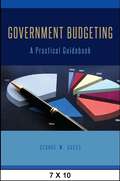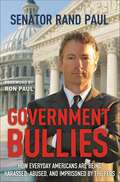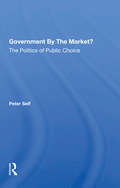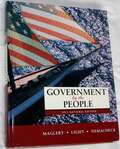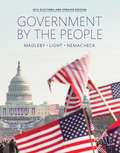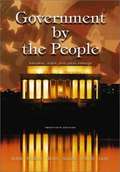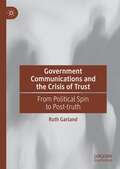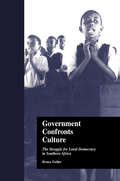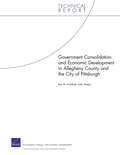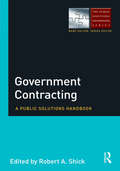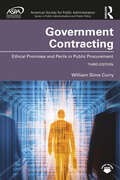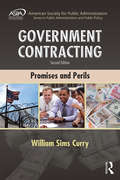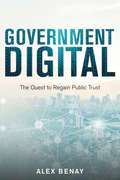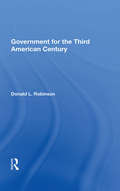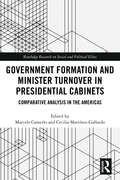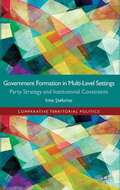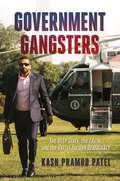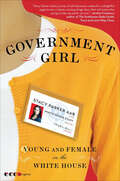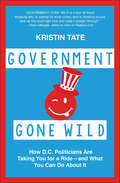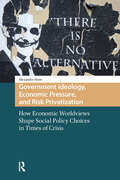- Table View
- List View
Government Budgeting: A Practical Guidebook
by George M. GuessDirected at state and local financial managers, Government Budgeting presents, in a short and succinct manner, a sampling of the major tools used to deal with current fiscal problems. George M. Guess provides examples from a number of states and localities and explains how to use them in diverse situations. At the end of each chapter, cases, exercises and/or questions are provided for further study. The chapters cover the major topics needed by today's practitioners: core concepts and definitions of budgeting and financial management; how to analyze the revenue budget and evaluate revenue sources; how one might plan expenditures and prepare an annual request; how capital projects should (and should not) be planned, analyzed, compared, placed into a capital improvements program, and financed; and the critical topic of budget implementation. Without claiming that practical tools can resolve every problem, the book suggests that if all stakeholders used such analytic tools the outcomes might be better for the general welfare.
Government Bullies: How Everyday Americans are Being Harassed, Abused, and Imprisoned by the Feds
by Rand PaulGovernment regulations are out of control. They dictate how much water goes into your commode, and how much water comes out of your showerhead. They determine how hot the water needs to be in your washing machine, and how many miles to the gallon your car must achieve. Since the Patriot Act, your banking records, your gun registration, and your phone bill are easily accessible by government snoops. Mothers are arrested for buying raw milk. Families are fined for selling bunny rabbits without a license. Home and property owners are strapped with obscene fines, entangled in costly legal messes, and sent to federal prison, all for moving dirt from one end of their land to another. Unelected bureaucrats, armed with arbitrary rules and no need to back them up, stonewall and attack American citizens at every turn. The damage can be overwhelmingly taxing -- -financially, emotionally and even physically. And who is being held accountable? Government regulation and red tape run amok in Washington, and honest, tax-paying citizens are the victims of an administration's misuse and abuse of power. Now, Senator Rand Paul of Kentucky, takes an in-depth look at the legislation that is trampling the rights of ordinary citizens, strangling their ability to conduct private, everyday activities without egregious government interference. He highlights outrageous searches, seizures and arrests, and points to thousands of regulations that have been added to the books since Obama took office. Most importantly, he charts a direction out of this mess, and toward renewed freedom for all Americans.These stories are of everyday Americans badgered and harassed by their own government -- -the very institution that is supposed to serve us all. This gross breach of our constitution is as frightening as it is real, and Goverment Bullies is a call to action against it.
Government By The Market?: The Politics Of Public Choice
by Peter SelfRecent decades have seen the study of politics invaded by economic theories, methods and techniques. This book gives a concise, non- technical account of these 'public choice' theories and examines their influence upon government policies in English-speaking countries. Issues covered include slimming the state, privatising welfare and re- structuring government. Final chapters offer an alternative view of the basis of good government. This book offers a unique survey and critique of the ideas and influence of an important branch of political thought and it links with market theories. It is vital reading for students of both politics and economics.
Government By The People 2011
by David B. Magleby Christine L. Nemacheck Paul Charles LightUpdated in a new 24th edition Government by the People, National, State, and Local Edition demonstrates that politics matters by emphasizing the accomplishments of a government of the people, by the people, and for the people. Building on decades of authoritative scholarship, this completely updated text continues to offer accessible, carefully crafted, and straightforward coverage of the foundations of American politics, as well as a consistent focus on the achievements of a government by the people.
Government By The People 2014 Elections and Updates Edition
by Paul C. Light David B. Magleby Christine L. NemacheckThroughout, authors David Magleby, Paul Light, and Christine Nemacheck highlight the central role that people play in a constitutional democracy, inspiring students to see how similarities and differences in political beliefs continue to shape government to this day. The 2014 Elections and Updates Edition includes coverage of the major issues in today's headlines to engage students in learning, as well as to boost the relevance of course material to students' lives.
Government By the People: National, State, and Local Version (20th Edition)
by James Macgregor Burns Thomas E. Cronin Paul C. Light David B. Magleby J. W. Peltason David M. O’brienGovernment by the People is considered the most authoritative text, educating students to understand how the American political system works.
Government Communications and the Crisis of Trust: From Political Spin to Post-truth
by Ruth GarlandThis book opens up the black box of government communication during the age of political spin, using archival and official documents, memoirs and biographies, and in-depth interviews with media, political and government witnesses. It argues that substantive and troubling long-term changes in the ways governments manage the media and publicly account for themselves undermine the public consent essential to democracy. Much of the blame for this crisis in public communication has been placed at the feet of politicians and their aides, but they are just part of the picture. A pervasive ‘culture of mediatization’ has developed within governments, leading to intended and unintended consequences that challenge the capacity of central public bureaucracies to implement public values and maintain impartiality. It concludes that public servants, elected officials and citizens have an important role to play in accounting for governments’ custodianship of this most politically-sensitive of public goods – the public communications function.
Government Confronts Culture: The Struggle for Local Democracy in Southern Africa (States and Societies)
by Bruce FullerTransitional societies—struggling to build democratic institutions and new political traditions—are faced with a painful dilemma. How can Government become strong and effective, building a common good that unites disparate ethnic and class groups, while simultaneously nurturing democratic social rules at the grassroots? Professor Fuller brings this issue to light in the contentious, multicultural setting of Southern Africa. Post-apartheid states, like South Africa and Namibia, are pushing hard to raise school quality, reduce family poverty, and equalize gender relations inside villages and townships. But will democratic participation blossom at the grassroots as long as strong central states—so necessary for defining the common good—push universal policies onto diverse local communities? This book builds from a decade of family surveys and qualitative village studies led by Professor Fuller at Harvard University and African colleagues inside Botswana, Namibia, and South Africa.
Government Consolidation and Economic Development in Allegheny County and the City of Pittsburgh
by Sally Sleeper Rae W. ArchibaldThis report concludes that, although evidence is mixed and effects difficult to measure, consolidating the City of Pittsburgh and Allegheny County could enhance economic development by unifying leadership, improving policy direction and coordination, and sharpening economic-development initiatives. Increased collaboration with the private sector also is important, and combining only two governments still leaves the region highly fragmented.
Government Contracting: A Public Solutions Handbook (The Public Solutions Handbook Series)
by Robert A ShickGovernment contracting is one of the most important issues facing federal, state, and local governments. As governments contend with lower tax revenues and a growing belief that smaller government is better government, contracting has become a fundamental means of providing goods and services to citizens. This volume, which is geared toward practitioners as well as students, addresses the broad range of issues that comprise government contracting – from the political, economic philosophy, and value of contracting – to the future of government contracting. Throughout the volume academic theory provides a foundation to address practical subjects, including the contract process, monitoring and evaluating contracts, ethics, and both federal and state local government contracting. Contributors to this volume are both academicians and practitioners, who together offer their scholarly expertise and practical experience, encouraging readers to ask the very question "What is the role of government in American society?" Through this approach, students will acquire the knowledge needed to understand the various aspects of government contracting, and practitioners will enhance their public procurement skills. Government Contracting is ideally suited to MPA students, practitioners in the public sector, and elected officials looking to enhance their understanding of privatization and contracting in order to provide public services more effectively.
Government Contracting: Ethical Promises and Perils in Public Procurement (ASPA Series in Public Administration and Public Policy)
by William Sims CurryThrough three comprehensive editions, Government Contracting: Ethical Promises and Perils in Public Procurement has been lauded for exposing fraud, incompetence, waste, and abuse (FIWA) and analyzing corruption, mismanagement, and ineptitude that defile government contracting. The first two editions thoroughly outlined procurement throughout the contracting cycle including initial planning, evaluating proposals, contractor selection, contract administration, contract closeout, and auditing. They further provided much-needed guidance on contracting documents, management tools, and processes for addressing negative influences on government contracting. This third edition incorporates the results of a new nationwide study into best public procurement practice, as well as recent examples of real-world procurement fraud cases, offering recommendations for procurement practices to deter fraud. Public procurement tools such as requests for proposals, pro forma contracts, proposal evaluation forms, sole source justification and approval forms, and other useful tools including PowerPoint presentations are provided on a website to accompany the book. This textbook is aimed at postgraduate students and academics working in the fields of public administration, policy and procurement, along with public procurement professionals.
Government Contracting: Promises and Perils (ASPA Series in Public Administration and Public Policy)
by William Sims CurryThe second edition of Government Contracting: Promises and Perils picks up where the first edition’s mission left off: exposing fraud, incompetence, waste, and abuse (FIWA) and analyzing corruption, mismanagement, and ineptitude that defile government contracting. The first edition thoroughly outlined procurement throughout the contracting cycle including initial planning, contractor selection, contract administration, contract closeout, and auditing. This significantly revised new edition provides additional much-needed guidance on contracting documents, management tools, and processes for addressing negative influences on government contracting, including an improved approach to evaluating proposals. Specific guidance for avoiding FIWA is provided for government officials and employees, government agencies, and government contractors, and practical solutions to problems faced by individuals and organizations involved in government contracting are intended for both practitioner and pedagogical applications. The "Government Procurement Corruption Wall of Shame" that was introduced in the first edition to illustrate contracting perils such as conflicts of interest, duplicity, favoritism, incompetence, kickbacks, and protests is continued in the second edition, and cases illustrating the existence of FIWA in government contracting have been thoroughly updated. Contracting documents and contract management tools are provided on a website designed to accompany the book. Written at the graduate level and specifically intended for state, local, federal, and international government procurement activities, this textbook is required reading for public procurement, contract management, business, and public administrations courses.
Government Deals are Funded, Not Sold: How to Incorporate Lobbying into Your Federal Sales Strategy
by Gene MoranAs identified by Bloomberg Government, the best-performing federal contractors all lobby Congress. We might guess that intuitively. The common perception of Washington, DC, as an insider's game, persists, and it makes sense that the winners lobby. However, focusing only on best-performing contractors limits the view of what unfolds through congressional lobbying or, more importantly, could unfold for even more companies—if they only recognized that they also have access to Congress. The tools of congressional influence are available to every company, yet the overwhelming majority of federal contractors eschew the opportunity to lobby Congress. Sadly, it’s not just that companies often don’t know how. It’s worse; they don’t know why lobbying Congress can be helpful. Defense represents the most significant portion of the federal budget annually reviewed and approved by Congress. As such, it's a valuable case study to understand what may contribute to a concentration of winners that garner federal contracts. Any company can learn by understanding more about lobbying in the defense industry. The inability or unwillingness to integrate lobbying into a sales strategy stems from hubris, ignorance, and lack of imagination. Thinking, "I've got this," and relying on their wits and narrow networks, too many defense executives struggle to gain real traction and consistently win large contracts. The result? The biggest winners aggregate at the top of the defense industrial base pyramid while the hundreds of thousands of "others" are left to wonder what just happened and why it’s so hard. This book focuses on those who do not lobby. It’s almost too easy to conclude the system is unfair, unlikely to change, and populated by well-connected insiders who move through the revolving door. Digging a little deeper, this book reveals that the real challenge to more democratized access to Congress is within our reach—if we could only see it!
Government Digital: The Quest to Regain Public Trust
by Alex BenayGovernments the world over are consistently outpaced by digital change, and are falling behind. Digital government is a better performing government. It is better at providing services people and businesses need. Receiving benefits, accessing health records, registering companies, applying for licences, voting — all of this can be done online or through digital self-service. Digital technology makes government more efficient, reduces hassle, and lowers costs. But what will it take to make governments digital? Good governance will take nothing short of a metamorphosis of the public sector. With contributions from industry, academic, and government experts — including Hillary Hartley, chief digital officer for Ontario, and Salim Ismail, founder of Singularity University 7#8212; Government Digital lays down a blueprint for this radical change.
Government Employment and Pay: Some International Comparisons
by Peter S. Heller Alan A. TaitHow many people are employed by the government? How many are employed by the central government compared with the state and local authorities? How many are employed in public enterprise? How much are they all paid? How much are they paid relative to each other, or relative to the private sector? Such questions interest people in general and economists and policymakers in particular;yet it is remarkable how little information is readily accessible on thes topics.
Government For Everybody
by Steven L. JantzenThe purpose of this book is to provide an engaging, readable and thorough course in U.S. Government. The consise reading passages, high graphics-to-text ratio, frequent question sets, and emphasis on vocabulary support the learning of students who have difficulty, while also being useful for all students.
Government For The Third American Century
by Donald L RobinsonThis book is a primer for debate about the fitness of the American political system as it moves toward the twenty-first century. It focuses on structural matters: the electoral process, the major institutions of the federal government and how they interact, and what we can do when they perform ineffectively or abuse their powers. Part 1 presents a
Government Formation and Minister Turnover in Presidential Cabinets: Comparative Analysis in the Americas (Routledge Research on Social and Political Elites)
by Marcelo Camerlo Cecilia Martínez-GallardoPortfolio allocation in presidential systems is a central tool that presidents use to deal with changes in the political and economic environment. Yet, we still have much to learn about the process through which ministers are selected and the reasons why they are replaced in presidential systems. This book offers the most comprehensive, cross-national analysis of portfolio allocation in the Americas to date. In doing so, it contributes to the development of theories about portfolio allocation in presidential systems. Looking specifically at how presidents use portfolio allocation as part of their wider political strategy, it examines eight country case studies, within a carefully developed analytical framework and cross-national comparative analysis from a common dataset. The book includes cases studies of portfolio allocation in Brazil, Chile, Colombia, Costa Rica, Ecuador, the United States, Peru and Uruguay, and covers the period between the transition to democracy in each country up until 2014. This book will be of key interest to scholars and students of political elites, executive politics, Latin American politics and more broadly comparative politics.
Government Formation in Multi-Level Settings
by Irina StefuriucThis book examines how parties negotiate coalition deals at the subnational level using the examples of Germany and Spain. In such multi-level settings, parties are present at various negotiation tables often having to make difficult choices about their role in the coalition and the relative merits of being in government over the opposition.
Government Gangsters: The Deep State, the Truth, and the Battle for Our Democracy
by Kash Pramod Patel&“A brilliant roadmap highlighting every corrupt actor, to ultimately return our agencies and departments to work for the American People…we will use this blueprint to help us take back the White House and remove these Gangsters from all of Government!&” —Donald J. Trump The highest levels of government have been infiltrated by an anti-democratic Deep State that can be defeated by refocusing our national security mission and relentlessly defending the truth.A sinister cabal of corrupt law enforcement personnel, intelligence agents, and military officials at the highest levels of government plotted to overthrow a president. Even after they failed, they continue to secretly pull the levers of power without any accountability to the American people. This isn&’t the synopsis of a fictional spy thriller. This is what is actually happening in the United States government. In Government Gangsters, Kash Patel—a former top official in the White House, the Department of Defense, the Intelligence Community, and the Department of Justice—pulls back the curtain on the Deep State, revealing the major players and tactics within the permanent government bureaucracy, which has spent decades stripping power away from the American people and their elected leaders. Based on his firsthand knowledge, Patel reveals how we can defeat the Deep State, reassert self-government, and restore our democracy.
Government Girl: Young and Female in the White House
by Stacy Parker Aab"A delightful page-turner…that will put the lucky reader within the feverish excitement of a hopeful and tragic time.”—Andrei Codrescu, NPR commentator and author of The Posthuman Dada Guide: Tzara and Lenin Play ChessA memoir of being young and female in the Clinton White HouseStacy Parker Aab was born in Detroit in 1974, the only daughter of a white Kansas farm girl and a young black Detroiter fresh from two tours of Vietnam. An excellent student, Aab gravitated toward public service and moved to Washington, D.C., for college in the hopeful days of 1992.Not only would Aab study political communication at The George Washington University, but she would also intern at the White House. For three years, she worked for George Stephanopoulos. In 1997 she became White House staff, serving as Paul Begala's special assistant.At first, life was charmed, with nurturing mentors, superstar politicos, and handsome Secret Service agents. In January 1998, the world of the Clinton White House changed radically. Monica Lewinsky became a household name, and Aab learned quickly that in Washington, protectors can become predators, investigators will chase you like prey, and if you make mistakes with a powerful man, the world will turn your name into mud.Government Girl is a window into the culture of the Clinton White House, as seen through the eyes of an idealistic young female aide. Stacy Parker Aab's intimate memoir tells of her coming-of-age in the lion's den. Her story provides a searing look at the dynamics between smart young women and the influential older men who often hold the keys to their dreams.
Government Gone Wild: How D.C. Politicians Are Taking You for a Ride—and What You Can Do About It
by Kristin TateWith humor and a modern perspective, young conservative journalist Kristin Tate points out what's broken in our government and shows readers how they can fix it. Do you really think you're "free?" #LOL.D.C. politicians ship our friends and family overseas to fight in wars we shouldn't be fighting. They monitor our emails, record our phone calls, and peer into our snail mail. They spend our hard-earned cash on things no disciplined family would buy. They tell us who we can marry and what we can put in our bodies. They throw us in overcrowded prisons for smoking pot. They take lavish trips around the world, staying in five-star hotels. . . and it comes straight out of our paychecks.This isn't freedom.Government Gone Wild is a brash, bold ride through the carnival of absurdities that our broken system has become. This isn't about Democrats vs. Republicans. . . it's about inspiring hard working Americans to give a damn so we can take our country back. This is your wakeup call. You're not anywhere near as free as you think you are -- but you can be. We're not as prosperous as we once were -- but we can be.
Government Ideology, Economic Pressure, and Risk Privatization: How Economic Worldviews Shape Social Policy Choices in Times of Crisis (Changing Welfare States)
by Alexander HornFrom the 1980s on, a privatization of labor market-related risks has occurred in the OECD. Governments have cut the generosity of social programs and tightened eligibility rules, particularly for the unemployed. Government Ideology, Economic Pressure, and Risk Privatization: How Economic Worldviews Shape Social Policy Choices in Times of Crisis analyses these curtailments for eighteen countries over the course of four decades and provides an encompassing comparative assessment of the interactive impact of government ideology and economic pressure. It demonstrates that the economic worldviews of governments are the most important factor in explaining why cuts are implemented or not. While ideas of non-intervention in the market underlie cuts in generosity, ideas of equality and fairness are at the heart of stricter eligibility criteria. This book also shows that the impact of the economic pressures often held responsible for the marginalization of politics and government ideology is in fact conditional on the specific ideological configuration.
Government In America: People, Politics And Policy
by Martin P. Wattenberg Robert L. Lineberry George C. EdwardsAn undergraduate text concentrating on constitutional foundations, patterns of political behavior, political institutions, and public policy outputs. Contains chapter summaries, key terms, and discussion questions, and boxes on politics since the 1960s; public opinion; comparison of the US with other nations in areas such as tax rates. Includes color photos and graphics. This second edition expands coverage of theories of democracy; fiscal federalism; the Constitution and religion; the media; and candidate-centered politics. Annotation c. by Book News, Inc. , Portland, Or.
